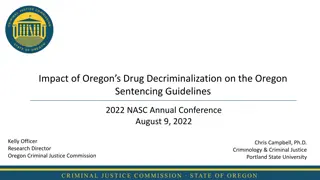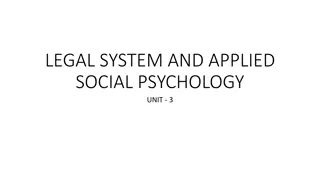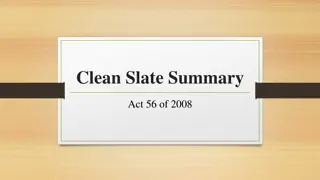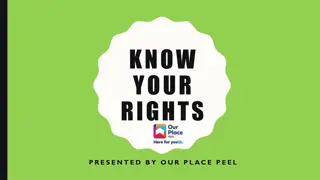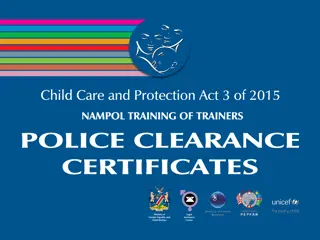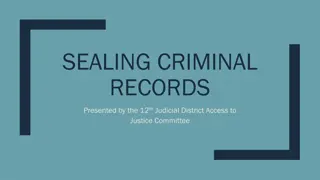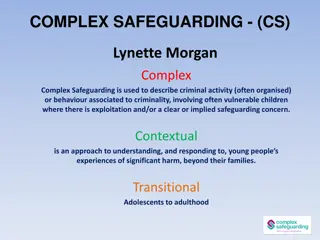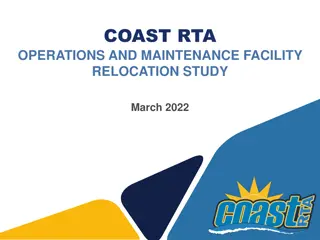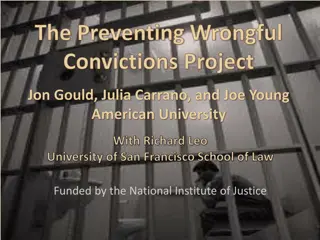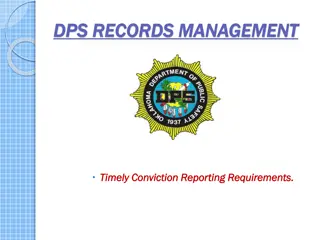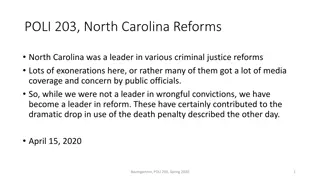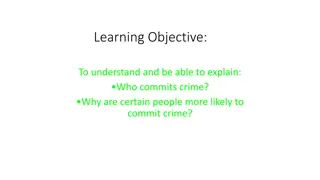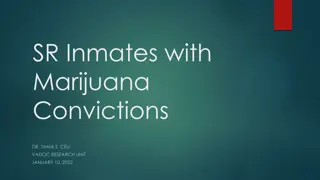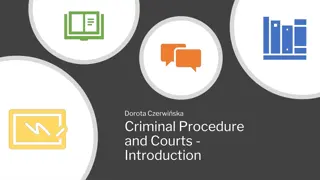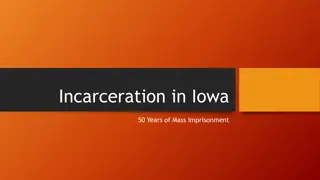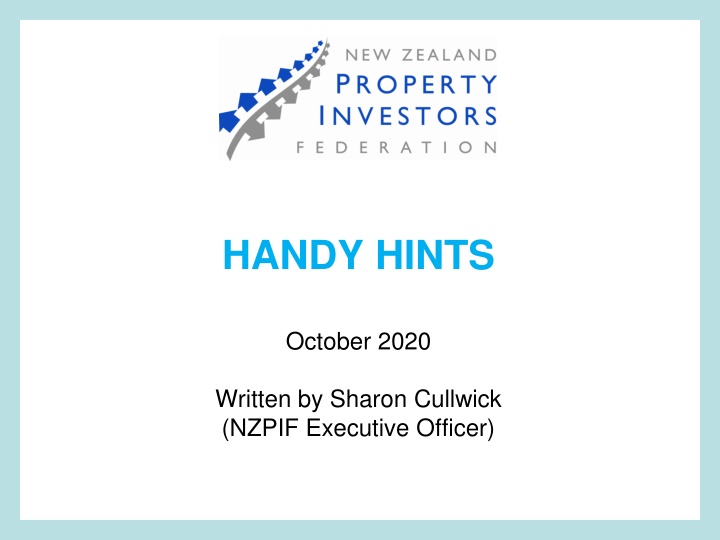
Helpful Tips for Property Owners and Landlords in Napier
Stay updated with the latest handy hints for October 2020 from Sharon Cullwick, the NZPIF Executive Officer. Find out about the updated NZPIF app, available places in the education program, new bond forms, asset depreciation changes, rent arrears assistance, associations liability insurance, and important Healthy Homes dates. Get valuable insights and resources to enhance your property management skills.
Download Presentation

Please find below an Image/Link to download the presentation.
The content on the website is provided AS IS for your information and personal use only. It may not be sold, licensed, or shared on other websites without obtaining consent from the author. If you encounter any issues during the download, it is possible that the publisher has removed the file from their server.
You are allowed to download the files provided on this website for personal or commercial use, subject to the condition that they are used lawfully. All files are the property of their respective owners.
The content on the website is provided AS IS for your information and personal use only. It may not be sold, licensed, or shared on other websites without obtaining consent from the author.
E N D
Presentation Transcript
Napier HANDY HINTS October 2020 Written by Sharon Cullwick (NZPIF Executive Officer)
NZPIF App The NZPIF app has been updated to accommodate the latest phones. The new app can be found in the App Store NZPIF Member info v2
Education Programme There are available places this month Free to members $300 for non members On line Self Managing Landlords Course Details can be found on NZPIF.org.nz Enrol and then you will be sent a date you can start the course.
New Bond Forms Tenancy Services have updated their bond forms. Ensure you are using the latest version for faster processing. Tenant email is no longer mandatory. Additional forms can now be attached to the one Bond Lodgement form.
Asset Depreciation Before 16thMarch 2020 - you could claim an immediate tax deduction for assets costing less than $500, instead of claiming depreciation over the following years. This has temporarily increased from17th March until 16 March 2021. Limit is now $5,000. (you can pool assets together). After 17thMarch 2021 it will go back to $1,000. Please check with your accountant and on the IRD web site.
Rent Arrears Assistance Housing Support Product This is a product to help tenants stay in their homes due to losing their jobs or reduced working hours Tenants should contact Ministry of Social Development. Available from 6thJuly 2020. Tenants need to prove hardship and they will be asset tested. Can help with overdue rent payments. Tenants can get up to $4000 in the next 12 month period.
Associations Liability Insurance Responds to a civil claim made against an association or a person serving or engaged by the association in carrying out their duties, whether salaried or not. Covers liability to the claimant as well as the cost of defending the claim. Both the association and individual officers of the association are covered. The policy includes any past, present or future director, secretary, officer, trustee committee member or employee of an association or any other person acting on behalf of the association or at the direction of management. The association is also covered for the cost of indemnifying its officer. Cover does not apply for Breach Of Professional Duty though.
Healthy Homes important dates From 1 July 2020 Now changed to 1 December 2020 Landlords must include a statement of their current level of compliance with the Healthy Homes standards in any new, varied or renewed tenancy agreement. From 1 July 2021 Private landlords must ensure their rental properties comply with the Healthy Homes standards within 90 days of any new, or renewed, tenancy. All boarding houses (except K inga Ora (formerly Housing New Zealand) and Community Housing Provider boarding house tenancies) must comply with the Healthy Homes standards. From 1 July 2023 All K inga Ora (formerly Housing New Zealand) houses and registered Community Housing Provider houses must comply with the Healthy Homes standards. From 1 July 2024 All rental homes must comply with the Healthy Homes standards
Heat Pumps There is a shortage of heat pumps Some cheaper heat pumps are out of stock Get organised early for the Healthy Homes requirements to avoid financial penalties.
Insurance update regarding a Tenants Criminal Convictions As a landlord you can ask your tenant for their criminal record, pre- agreement and then on lease renewal. (this is ok by the Privacy Commissioner). All insurance policies are different and some will not insure your property if the tenant has a criminal conviction. Convictions do not necessarily mean an insurer will cancel cover, but it s a risk factor they want the chance to consider. Take care when selecting tenants Check your insurance policy wording or talk to your insurer.
Tenancy Agreements Have you added in a clause for no- smoking inside? Does this include vaping inside? After the cannabis referendum you may need to change this again. Check your agreement to make sure this is covered.
Healthy Homes important dates From 1 July 2020 Now changed to 1 December 2020 Landlords must include a statement of their current level of compliance with the healthy homes standards in any new, varied or renewed tenancy agreement. From 1 July 2021 Private landlords must ensure their rental properties comply with the healthy homes standards within 90 days of any new, or renewed, tenancy. All boarding houses (except K inga Ora (formerly Housing New Zealand) and Community Housing Provider boarding house tenancies) must comply with the healthy homes standards. From 1 July 2023 All K inga Ora (formerly Housing New Zealand) houses and registered Community Housing Provider houses must comply with the healthy homes standards. From 1 July 2024 All rental homes must comply with the healthy homes standards
Paper work and more paperwork These are on all new , varied or renewed Tenancy agreements From 1 July 2016, landlords have needed to provide an insulation statement in all new tenancy agreements From 1 July 2019, landlords must include a Healthy Homes Statement that the property does or will comply with the HHS. From 27 August 2019, must disclose whether or not the property is insured. Amount insured for, who it is insured by and the excess. From 1stDecember 2020 - landlords must include a statement of their current level of compliance with the healthy homes standards.
The RTA Amendment Bill: Received the Royal Assent on the 11thAugust so it becomes law in 6 months. (February 11th2021)
The RTA Amendment Bill: When looking on line for the bill be careful to get the correct one it is 218-2 The link can be found here: http://legislation.govt.nz/bill/government/2020/0218/latest/LMS29492 9.html
Residential Tenancies Act 2020 Summary of changes
Periodic Tenancies Previous Can be ended by the landlord with 90 days notice for any reason and without a requirement to tell the tenant why. Notice periods are 42 days to end a periodic tenancy where: The owner, or their family member, requires the property to live in. The property is needed for an employee (and this is in the tenancy agreement). The property has been sold with a requirement by the owner for vacant possession. Notice period is determined by the Tenancy Tribunal when landlord applies to the Tribunal to end the tenancy Tenant is at least 21 days in rent arrears Tenant has assaulted or threatened to assault the landlord or others. Tenant has caused or threatened to cause substantial damage. Tenant has not complied with a 14 day notice to remedy a breach of the RTA or tenancy agreement.
Periodic Tenancies New Periodic tenancies can only be ended by the landlord for one of the following reasons: Notice period is determined by the Tenancy Tribunal when landlord applies to the Tribunal to end the tenancy The landlord issued a tenant three notices for separate anti-social acts in a 90-day period. The landlord gave notice that a tenant was at least five working days late with their rent payment on three separate occasions within a 90-day period. The landlord will suffer greater hardship than the tenant if the tenancy continues. Existing provisions relating to rent arrears, damage, assault and breaches still apply.
New Timelines New 14 day notices The tenant physically assaulted the landlord or their family and the Police laid a charge. 63 days notice The owner, or their family, requires the property to live in. The landlord customarily uses the premises for occupation by employees or contractors and the premises are needed for that purpose (and this is stated in the tenancy agreement).
New Timelines New 90 days notice The owner intends to put the premises on the market. The property has been sold with a requirement by the owner for vacant possession. The landlord is not the owner of the property, and the landlord s interest ends. The premises need to be vacant to facilitate the use of nearby land for a business activity (and this is stated in the tenancy agreement).
New 90 days notice (Continued) The landlord wants to change the use of the premises to a commercial use. The landlord intends to carry out extensive renovations at the property and it would be impractical for the tenant to live there during that process. The premises are to be demolished Reasons specific to social housing tenancies.
Fixed Term Tenancies Previous Fixed-term tenancy agreements cannot be ended early unless by mutual agreement or Tribunal order. New A landlord can terminate a fixed-term tenancy with 14 days notice where the tenant physically assaulted the landlord or their family and the Police laid a charge.
Fixed Term Tenancies Previous Fixed-term tenancy agreements convert to periodic tenancies unless: a landlord or tenant gives notice between 21 and 90 days before the term ends. The parties agree to extend or renew the fixed-term tenancy. New Fixed-term tenancy agreements convert to periodic tenancies unless: A landlord gives notice using the reasons listed in the RTA for periodic tenancies A tenant gives notice for any reason at least 28 days before the end of the tenancy The parties agree otherwise e.g. to renew the fixed term or to end the tenancy
Family Violence Previous Withdrawal by tenant experiencing family violence Nothing specific to support tenants experiencing family violence. New Tenants who are experiencing family violence can withdraw from a tenancy by giving two days notice, accompanied by appropriate evidence of the family violence. Regulations will be created to specify what constitutes evidence. Provisions are also included for protecting the privacy of a victim from unauthorised disclosure of this notice and in relation to Tenancy Tribunal hearings. Remaining tenants in the tenancy may receive a temporary rent reduction formula.
Installing a minor change Previous Installing a minor change tenants must get landlord s consent and landlords cannot unreasonably withhold their consent. New Where a tenant requests a change that is minor, the landlord must give permission. The Residential Tenancies Act 1986 outlines what changes will be minor. The landlord can impose reasonable conditions around how that minor change is carried out. Tenants must remove the minor changes and remediate the property when the tenancy ends.
Fibre broadband Previous Landlords have no obligations relating to fibre broadband. The Ultra-Fast Fibre Broadband Scheme offers fibre installation for free but relies on mutual agreement. New Tenants can request to install fibre broadband and landlords must facilitate installation if this can be done at no cost to the landlord. Landlords can decline a request for fibre installation where: It will materially compromise the building s weathertightness or character. It will compromise the building s structural integrity. It will breach an obligation relevant to the premises. The landlord is going to carry out extensive renovations.
Rent setting and increases Previous Rent setting and increases No rules around rental bidding. Rent can be increased every six months. New Landlords and agents cannot seek rental bids. This includes advertising rental properties with no rental price listed. Tenants are still allowed to offer to pay more for a property if they want. Rent cannot be increased more than once every 12 months.
Privacy and access to justice Previous Privacy and access to justice Name suppression provisions are unclear. New The Tribunal, on the application of any party or on its own initiative, can order that names and identifying details be suppressed. Where a party has been wholly or substantially successful in their case, identifying details can be removed from published Tribunal orders.
Assignment Previous Fixed-term tenancy agreements can prohibit assignment. New All assignment requests must be considered, and landlords must not decline unreasonably. Fixed-term tenancy agreements cannot prohibit assignment.
Providing information Previous Landlords can charge reasonable fees on agreement to assignment, subletting or ending a tenancy (break lease fees), but do not have to disclose how the fees are calculated. Under the healthy homes standards landlords will have to keep various records and provide them on request to the Regulator (MBIE).
Providing information New Landlords must provide tenants with a breakdown of fees charged on agreement to assignment, subletting or ending a tenancy (break lease fees). This will give tenants an opportunity to consider if the fees are reasonable. Landlords will also have an obligation to provide the records relating to healthy home standards on request to tenants. Landlords will have to retain additional documents and provide them to the Regulator if required.
Enforcement of the RTA Previous No infringement offences. Penalty levels set in 2006. Regulator (MBIE) enters into voluntary agreements for parties to comply with RTA obligations. No ability for Regulator (MBIE) to issue improvement notices.
Enforcement of the RTA New New infringement offence regime for straightforward breaches of the RTA. Existing penalties increased between 50 and 80 percent. Regulator (MBIE) can enter into Enforceable Undertakings voluntary agreements for parties to comply with RTA obligations, with a penalty if not complied with. Regulator (MBIE) can issue Improvement Notices to correct a breach of the RTA. Improvement Notices carry a penalty if not complied with.
Tenancy Tribunal Previous The Tribunal can hear cases and make awards up to $50,000. New Tenancy Tribunal can hear cases and make awards up to $100,000. Civil pecuniary penalties, higher maximum infringement fees and higher infringement fines for landlords with six or more tenancies, including boarding house landlords.
Transitional and emergency housing Previous It is not clear whether the RTA applies to some transitional and emergency housing. New Clarifies that the RTA does not apply to transitional and emergency housing that is provided under the Special Needs Grant Programme or that is funded wholly or partly by a government department. A Code of Practice will be developed to set out expectations for transitional housing.
Documentation Required for RTA 2020 A landlord must retain the following documents (or copies of them) during, and for 12 months after the termination of, the tenancy: (a) the tenancy agreement and any variations or renewals of it: (b) any reports of inspections of the premises carried out by or for the landlord during the tenancy: (c) records of any building work for which a building consent is required, prescribed electrical work, sanitary plumbing, gasfitting, or other maintenance or repair work carried out at the premises by or for the landlord during the tenancy: (d) any reports or assessments by a professional tradesperson of work that is carried out or is required in relation to a premises that relates to the landlord s compliance with section 45 or 66I:
Documentation Required for RTA 2020 (continued) (e) the records or other documents that relate to the landlord s compliance with the healthy homes standards and that are prescribed by regulations under section 138B(5): (f) any advertisement for the tenancy (including an advertisement from before the commencement of the tenancy): (g) any notices or correspondence between a landlord (or a person acting on the landlord s behalf) and (i) a tenant (or a person acting on the tenant s behalf) in relation to the tenancy: (ii) a prospective tenant (or a person acting on the prospective tenant s behalf) in relation to the tenancy.
Napier Thank you


